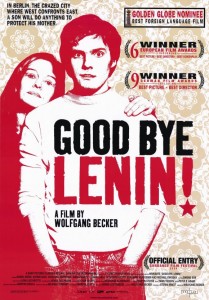 Ostalgie is a German term composed of Ost (East) and Nostalgie (nostalgia). It refers to the history and culture of the GDR, and relates to former East Berlin – the current location of ECLA. The film screening of ‘Good Bye Lenin!’ followed by the guest lecture by Dr. Sean Allan from the University of Warwick took place in the last week of the academic term.
Ostalgie is a German term composed of Ost (East) and Nostalgie (nostalgia). It refers to the history and culture of the GDR, and relates to former East Berlin – the current location of ECLA. The film screening of ‘Good Bye Lenin!’ followed by the guest lecture by Dr. Sean Allan from the University of Warwick took place in the last week of the academic term.
The first part of the lecture addressed how contemporary German cinema depicts the past and how the GDR was represented in post 1991 films. As Dr. Allan described, earlier post-reunification cinema tended to be more dramatic, because directors made films which they could not do in the former GDR. In contrast, later the employment of comedy to depict a traumatic past has proven quite popular, with more than five million people viewing ‘Good Bye Lenin!’ in the first two weeks after its release.
‘Good Bye Lenin!’ presents a universal narrative: the love between a mother and her son, the idyllic personal memories of childhood stretched into collective impressions of the period. The world of East Germany reconstructed and performed by the film characters intensifies the Ostalgie phenomenon. East German lifestyle recreated by the characters becomes what they would have wished the GDR to be in reality – in the words of Dr. Allan “the ultimate Ostalgie”.
Coming to terms with the past has its own German word: Vergangenheitsbewältigung. The way in which nostalgia and memories are connected in the film allows for ‘Good Bye Lenin!’ to escape the political background of the period. This personal, humane approach to political events, with emphasis on the individual, who is affected by history, is the current approach of new German cinema addressing Germany’s past.
By Clara Sigheti (2007, Romania)
